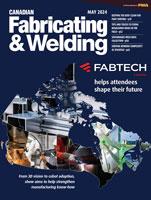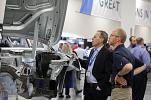- FMA
- The Fabricator
- FABTECH
- Canadian Metalworking
Breathe easy - keys to healthy lungs in the shop environment
Keeping grinding particulates out of workers’ lungs is simple and a safety must for shops everywhere.
- By Canadian Metalworking
- March 27, 2014
- Article
- Fabricating
When it comes to workplace safety, there’s a spectrum of rules and regulations administered by federal, provincial and territorial governments, not to mention quasi-governmental organizations like Ontario’s Workplace Safety and Insurance Board. Most regulations are designed to protect workers from the clear and present dangers of toxic chemicals, injury and exposure to dangerous levels of radiation, light, noise, fumes and dust.
Dust, or more generically airborne particulates, is a natural consequence of both offhand and machine grinding operations. It’s easy to control in machine work through wet grinding or dust extraction systems, but many Canadian shops, especially fabricating shops, rely on hand grinding with angle grinders for weld clean-up, deburring, snagging castings and surface prep.
All generate fine particles which can be inhaled by workers, a situation that’s exacerbated by new advanced abrasives that have dramatically increased material removal rates. Protection against sparks and flying particles with goggles, face shields and gloves is a given, but the effects of breathing airborne particulates aren’t immediately apparent. It’s both the employer’s and worker’s responsibility to provide and use personal protective equipment that includes protection against inhaled grinding dust.
Three different techniques for preventing dust inhalation:
The first is simple filtration and is the most common. These masks are usually disposable and are widely used and low cost. The filtering ability of the simple masks varies widely, but the US National Institute for Occupational Safety and Health (NIOSH) uses a common rating system widely used in Canada.
N95 rated masks are the most common approved type mask, filtering at least 95 per cent of airborne particles. Surgical masks are commonly N95 rated, but not all N95 masks are approved for medical use. Surgical masks are not necessary for grinding operations, but if the environment contains liquid mists such as coolants and cutting oils, masks require R95, P95 or better certification for oil resistance.
Conventional N95 masks are cheap and easy to use, but must be worn properly to be effective. Ideally the mask should have two straps and have a metal strip allowing the user to form the mask around the bridge of the nose.
Depending on the metal and the grinding environment, it’s possible that grinding dust is accompanied by vapours or toxic gases created by chemical reactions due to the heat of grinding and the large surface area of metal particles exposed to oxygen in the air. Some like beryllium are toxic, while others, notably magnesium, are serious fire hazards. If the metal substrate produces toxic gases, the paper mask is inadequate. In that case the cartridge type respirator must be used with cartridges specifically rated for toxic chemical exposure.

This 3M surgical type mask fits well and is N95 certified, making it ideal for many offhand grinding applications.
Similar to gas masks, they are available in full face or half mask models. Depending on the type of exposure, the replaceable cartridges may become ineffective before the resistance to airflow becomes noticeable by the user. It’s essential to swap out cartridges at the manufacturer’s recommended interval for the type of exposure, regardless of airflow through the mask.
Both these types filter aerosols and suspended particulates out of ambient air, but both require atmospheres with normal, breathable amounts of oxygen. In the chemical, process and oil and gas industries however, working inside pipes, tanks and pressure vessels as well as other enclosed spaces can create local working environments with insufficient oxygen for worker safety.
Oxidation of grinding particles is accelerated by the heat of grinding; even rusting removes oxygen from the atmosphere in an enclosed space. The solution is to make up the missing breathable air with air supplied by an outside line, a portable bottled supply, or both.
Costs are significantly higher for these positive pressure masks, making it more cost-effective to use engineering solutions like dust extraction and ventilation equipment in most cases, but ad hoc solutions might not be legal in enclosed space work. For very aggressive processes like abrasive blasting, the all-enveloping suit and hood makes positive air supply essential.
Staying safe, staying legal:
The key to keeping the worker safe and the operation legal is the understanding that the goal is to prevent exposure, not use a specific piece of approved equipment.
In many instances, it’s cheap and effective to vacuum grinding dust away from the work piece and provide adequate makeup air with good ventilation. In still air however, even outdoor work may require a filter mask. In most shop environments, the grinding dusts are dry and non-toxic, which gives shop owners considerable latitude in choosing a safety strategy.
While there are many certified dust extraction systems for example, for most ferrous grinding operations, any engineered system that keeps particulates away from the worker’s lungs meets the need. Personal protective equipment however, is different. Whether employer supplied or employee owned, filter masks and respirators must be rated and approved for inhaled particulate filtration. It’s also required by both parties that the PPE is actually used... and used properly.
Low-cost, off brand filter masks for example, frequently fit poorly around the nose and mouth, rendering them ineffective and if they promote fogging of face shields or goggles, encourage the user to do without.
If the mask or respirator makes it too difficult or impossible to grind the part effectively, it’s a legal imperative to replace it with equipment that works. For most shops, a quality, N95 dual strap disposable paper mask under a certified polycarbonate face shield is adequate, low-cost protection for hand grinding operations.
About the Author
subscribe now


Keep up to date with the latest news, events, and technology for all things metal from our pair of monthly magazines written specifically for Canadian manufacturers!
Start Your Free Subscription- Industry Events
MME Saskatoon
- May 28, 2024
- Saskatoon, SK Canada
CME's Health & Safety Symposium for Manufacturers
- May 29, 2024
- Mississauga, ON Canada
DiPaolo Machine Tools Open House 2024
- June 4 - 5, 2024
- Mississauga, ON Canada
FABTECH Canada
- June 11 - 13, 2024
- Toronto, ON Canada
Zoller Open House & Technology Days 2024
- June 12 - 13, 2024
- Ann Arbor, MI






















